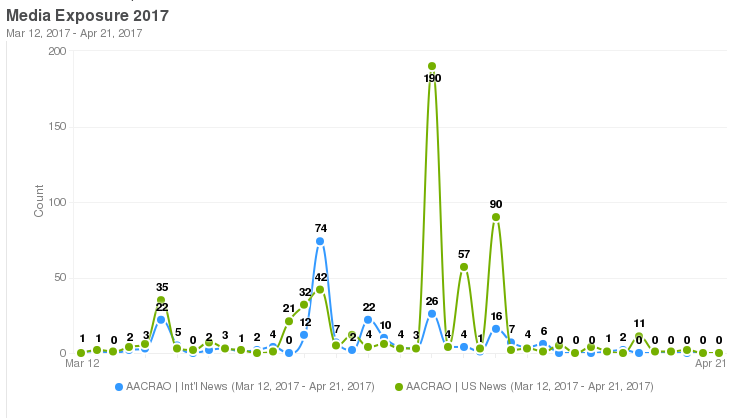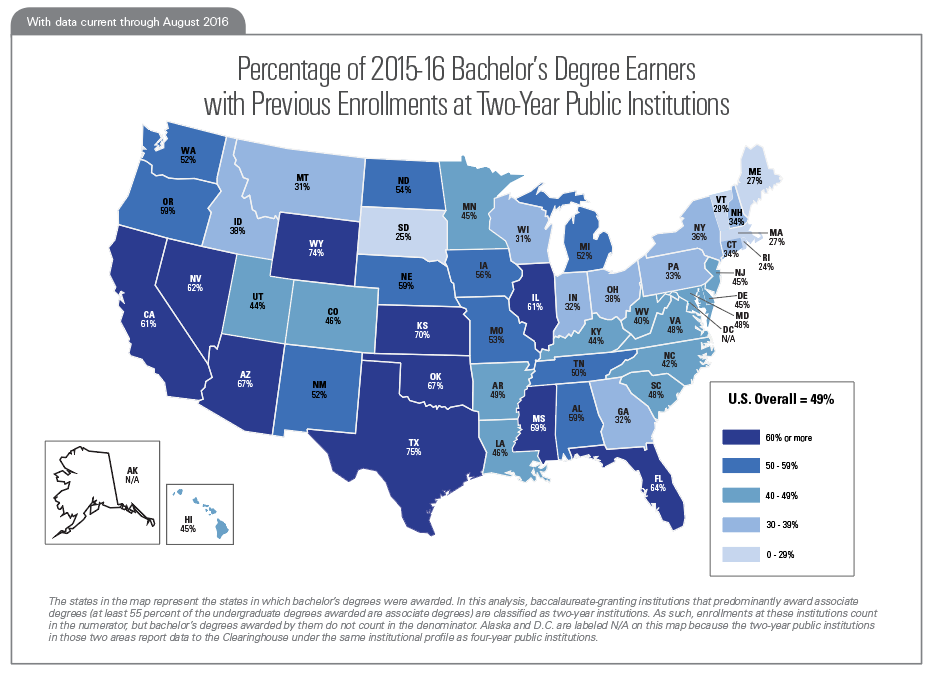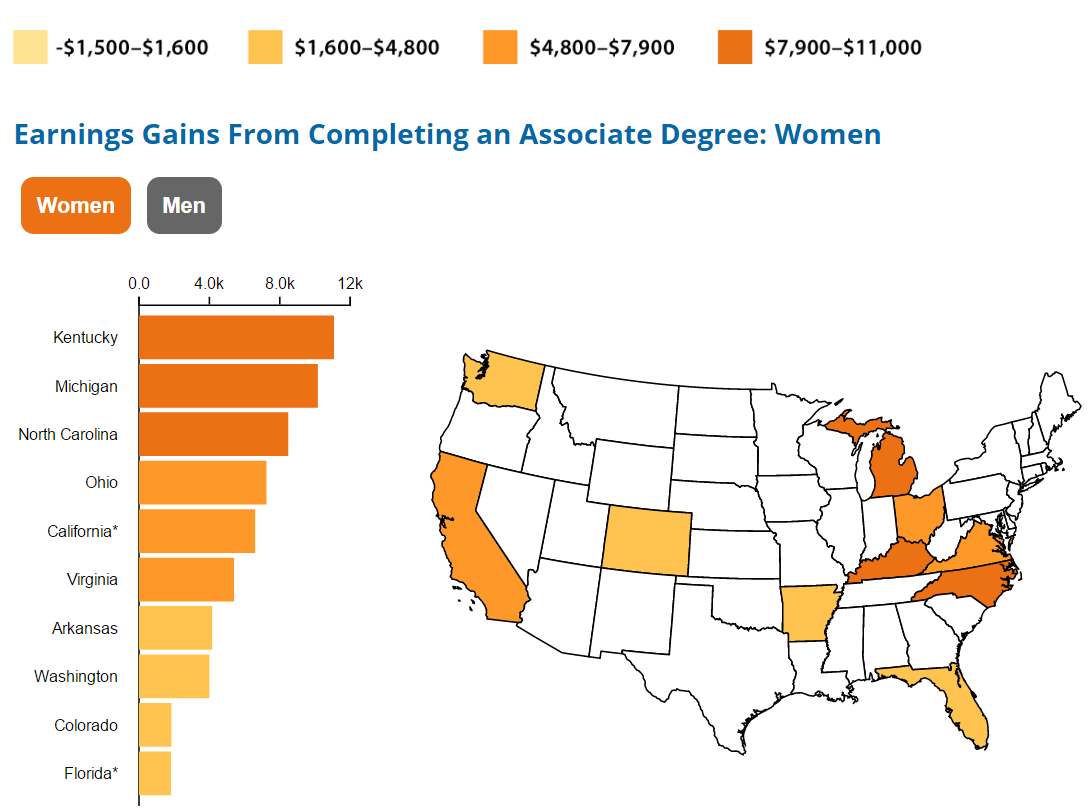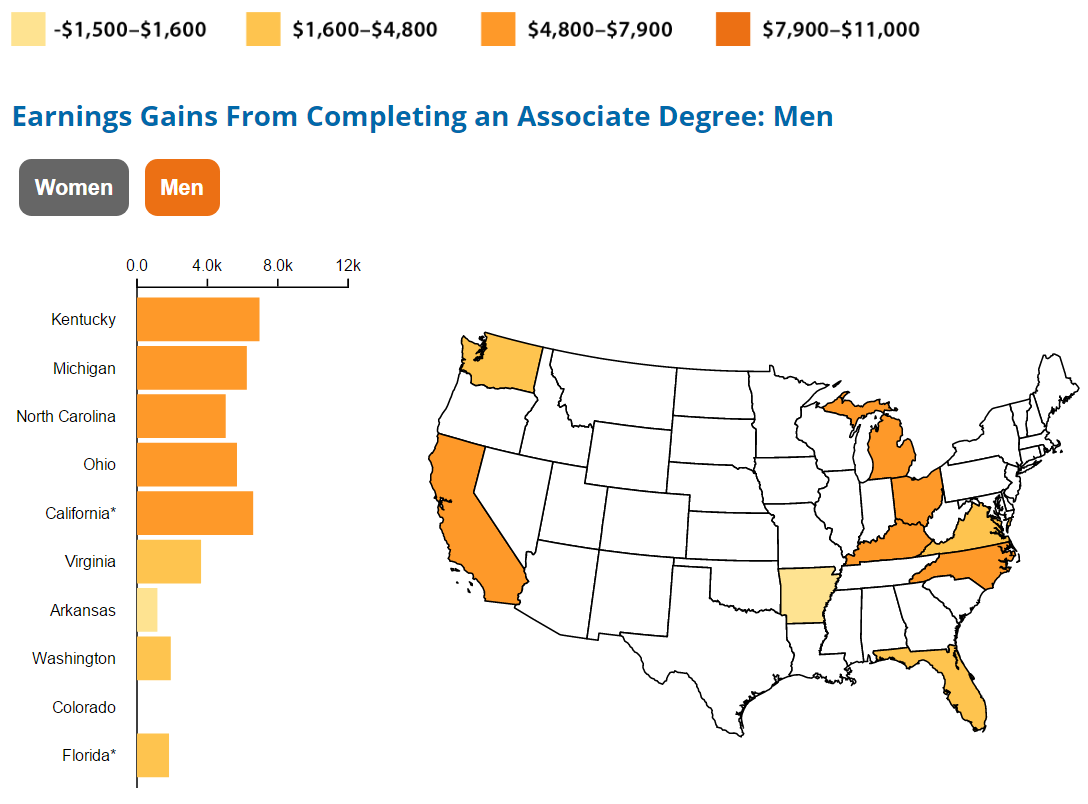Commentary
By Melanie Gottlieb
AACRAO research received extensive media coverage in March and April due to the release of the final report “International Applicants for Fall 2017 – Institutional & Applicant Perceptions” (see summary below) on April 4th. The survey clearly tapped into the anxiety felt by higher education institutions and the media since the change in administration (see figure 1 below). The early release of results on March 13th focused on the drop in application numbers, specifically in the Middle East, Asia and Latin America. This was covered by the media as an example of the “Trump effect,” with some media outlets sharing the data in a somewhat misleading context, despite AACRAO’s accompanying text that characterized the intent as merely a snapshot. For the full release on April 4th, AACRAO attempted to shift the conversation away from the drop in applications, instead focusing on the specific nature of concerns from the various regions and the institutional tactics to assuage those concerns.

Figure 1: Media coverage of AACRAO survey
New Research Advisory Board Member
By Wendy Kilgore
 Dr. William (Bill) DeWolf, Registrar at Emerson College, is our newest member of the research advisory board. Bill has been working in leadership positions in higher education administration and student administrative services for more years than he cares to admit. He has experience at four-year public and four-year private institutions in the Northeast and Mid-West. Bill was also the University Registrar at the former Medical College of Pennsylvania – Hahnemann University with experience merging two distinct medical schools into the largest medical school in the United States. He is passionate about registrar business processes, student administrative services (one-stop environments), international programs (ACE Internationalization & Globalization at Emerson College), legal issues in higher education (particularly FERPA), competency-based programs, strategic vision as it relates to and in the registrar’s office and public policy.
Dr. William (Bill) DeWolf, Registrar at Emerson College, is our newest member of the research advisory board. Bill has been working in leadership positions in higher education administration and student administrative services for more years than he cares to admit. He has experience at four-year public and four-year private institutions in the Northeast and Mid-West. Bill was also the University Registrar at the former Medical College of Pennsylvania – Hahnemann University with experience merging two distinct medical schools into the largest medical school in the United States. He is passionate about registrar business processes, student administrative services (one-stop environments), international programs (ACE Internationalization & Globalization at Emerson College), legal issues in higher education (particularly FERPA), competency-based programs, strategic vision as it relates to and in the registrar’s office and public policy.
Bill is currently an active member of AACRAO, NEACRAO and NEBUG, and has been associated with MSACROA and MACRAO. He has served in various roles, on committees such as Professional Development (AACRAO, NEACRAO and MACRAO) and Nominations & Elections (NEACRAO). He has made numerous presentations at AACRAO’s Annual Meetings and NEACRAO and MSACROA conferences, on topics ranging from advice for new or transitioning registrars, one-stop environments, online submission of grades and public policy. In 2010, AACRAO inaugurated the Public Policy Advisory Committee and asked Bill to become the chair. He served in that capacity until 2015. In 2014, AACRAO awarded the Thomas A. Bilger Citation for Service Award to Bill at AACRAO’s Annual Meeting in Denver, CO.
Bill holds B.S. and M.S. degrees from the State University College at Buffalo and a Ph.D. from The Florida State University. Dr. DeWolf is filling the vacancy left by Tysa Egleton who served since 2015 as an inaugural member of the advisory board.
Upcoming and Ongoing AACRAO Research
Community College Completion Initiatives
This project is well underway with the student data collection phase completed, the literature review drafted, and the institutional survey set to close by the end of April. We have made a slight change in our plans for this project in that instead of very brief institutional overviews based on interviews, we hope to take a deeper dive into a few institutions representing differences in size, type and location.
May 60-Second Survey
AACRAO, in conjunction with other higher education associations, is writing a new version of the Joint Statement on the Transfer and Award of Credit. This original statement was written in 2001 and, while forward thinking, needs to be updated to address current and future higher education trends. The goal of this rewrite is to identify transfer credit best practices and to provide guiding principles for working with transfer credit and transfer students. The May 2017 60-Second survey is designed to capture a snapshot of current policy and to seek input from the membership about what guidance AACRAO can provide on the topic of transfer policy.
Policy Repository Update
We collected the first set of policies through the undergraduate grading survey. The May 60-Second survey will include a request for transfer policy examples. The graduate grading policies will be collected in May as well. We hope to have an initial beta-release of the repository later this year.
Current Higher Education Research and Related Topics
Three Studies All Point to the Current U.S. Political Climate Having the Potential to Negatively Impact International Student Enrollment.
AACRAO - Perceptions of immigration policy changes cause concerns for international students and their families about study in the U.S.
AACRAO, in partnership with the Institute of International Education (IIE), the International Association for College Admission Counseling, the National Association for College Admission Counseling and NAFSA: Association of International Educators, released the final report of the “International Applicants for Fall 2017 – Institutional & Applicant Perceptions.” It revealed concerns ranging from perception of a rise in student visa denials at U.S. embassies to concerns that benefits and restrictions around visas could change.
Last month the group issued an early release of key findings from their February 2017 member survey due to the increased and continued focus on immigration issues. The inter-associational survey was conducted in response to expressed concern from international educators that the political discourse leading up to the November 2016 U.S. presidential election could be damaging to institutional recruitment efforts. Approximately 300 institutions responded to the survey.
The survey tapped into the anxiety felt by higher education institutions and the media since the change in administration, resulting in extensive media coverage (see figure 1 below). The early release of results on March 13th focused on the drop in application numbers, specifically in the Middle East, Asia and Latin America. For the full release on April 4th, AACRAO attempted to shift the conversation away from the drop in applications, instead focusing on the specific nature of concerns from the various regions and the institutional tactics to assuage those concerns.
This snapshot data could be an early indicator of a potential slowdown or decrease in international student enrollments for the Fall 2017 enrollment period, a decline that would have major negative economic impacts for institutions and potentially could result in an increase in tuition for U.S. students. Other key survey findings include:
- 77% of institutions expressed concerns regarding application yield, with data that aligns closely to the countries of concern.
- 38% of responding institutions reported a decline in international applications; 35% reported an increase; and 27% reported no change in applicant numbers.
The group plans a follow-up survey next month to obtain a first look at institutional yield. While the final enrollment numbers for Fall 2017 will not be known by institutions until their international students arrive at the start of the Fall 2017 semester in mid-August, a comparison of accepted offers and deposits from last year to this year will be a useful tool to help gauge the impact of shifts in immigration policies on institutional enrollment.
AACRAO and its partner associations will continue to monitor this issue in order to provide tools for institutions to manage their enrollments.
Academic Impressions - The Trump Effect on International Students: Early Indications and Insights
Similar to the intra-organizational survey completed by AACRAO, Academic Impressions completed a survey of “over 100 enrollment managers and international education professionals” on the subject of negative consequences on international student enrollment in the United States based on the current political climate. Their findings were similar to AACRAO’s, and a select few have been included here.
“What impact on international enrollment do you anticipate from the current White House administration’s policies?
- 44% expect HIGH impact, not only on enrollment from Muslim-majority nations, but from other key international markets (China, South Korea, India, etc.) as well
- 12% expect HIGH impact, but only on enrollment from Muslim-majority nations
- 22% don’t know
- ONLY 4% of respondents expect no impact.”
Royall & Company - 2017 International Student Enrollment Survey: Travel ban implications on higher education
More than 2,000 students from 150 countries were surveyed by Royall & Company about their interest in studying in the United States. One in three respondents indicated their interest in studying in the United States has decreased due to the political climate, with those from the Middle East representing the highest percentage with decreased interest.
NSC Research Center – Completing College: A National View of Student Attainment Rates by Race and Ethnicity, Fall 2010 Cohort
This Lumina Foundation supported student level report examined the 6-year degree and certificate completion rates for the fall 2010 cohort. NSC working with the University of Chicago to create a representative sample of schools and the completion rate “includes students who completed a degree or certificate at a different institutions from where they started.” Data was disaggregated by race and ethnicity data. Among the key findings the authors found that black students had the lowest six-year completion rate (45.9%) compared to white (67.2%) and Asian (71.7%) students. They also found that “the completion gap between racial groups tend to shrink as students grow older.”
NSC Research Center Snapshot Report: Contribution of Two-Year Public Institutions to Bachelor’s Completions at Four-year Institutions
NSC studied the enrollment patterns for a ten-year period for those who completed a bachelor’s degree in 2015-16. Key findings include:
- 49% of all bachelor’s degree earners enrolled at a two-year public institution at some point in that ten-year period
- 22% were only enrolled at a two-year institution for one term
- More than half of the 2015-16 graduating cohort had previous enrollment in a two-year public institution in 20 states.

Source: https://nscresearchcenter.org/snapshotreport-twoyearcontributionfouryearcompletions26/
CAPSEE Infographic: The Value of Associate Degrees and Certificates
The figures below were created by CAPSEE from their report The Labor Market Returns to Sub-Baccalaureate College: A Review. Researchers found that, in general, women receive a larger boost from earning an associate degree compared to men ($7,160 vs. $4.640 more per year).

Source: http://capseecenter.org/research/by-the-numbers/earnings/

Source: http://capseecenter.org/research/by-the-numbers/earnings/
CAPSEE Working Paper - Labor Market Trajectories for Community College Graduates: New Evidence Spanning the Great Recession
This study followed students who earned either a certificate or associate’s degree from an Ohio community college for up to 11 years after they initially entered. The authors found their data supported “prior findings regarding the positive early returns to associate degrees and long-term certificates.” They also found that while the returns of an associate degree grow after graduation, the returns of the certificate do not.
NCES Guide to Descriptive Analysis Education
This new guide from NCES provides guidance on how to more effectively approach quantitative descriptive analysis. This type of analysis is defined in the guide: “Descriptive analysis characterizes the world or a phenomenon— identifying patterns in the data to answer questions about who, what, where, when, and to what extent.” The target audience of this guide are researchers who conduct descriptive and cause studies using large-scale data.
CCRC Early Insights Report on AACC Guide Pathways Colleges
CCRC interviewed staff from all 30 institutions who are currently participating in the AACC Guided Pathways project. Researchers also visited six colleges. The report based on this work highlights the progress towards implementing the guided pathways. A few of the key findings from the report are included here:
- “The colleges are redesigning their websites to show how program maps connect to career and transfer opportunities.
- The colleges are trying to find a balance between providing too much and too little choice.
- The colleges are ensuring that students get a taste of a field of interest in their first semester.
- Some of the colleges are beginning to build pathways down into high schools, often starting with dual enrollment students.
- The colleges in the AACC Pathways are redefining advising roles—and in some cases hiring new advisors—to support a more proactive model of advising, with check-ins at key decision points along students’ paths.
- Most of the colleges are trying to create more predictable schedules and taking other steps to enable students to complete their programs more quickly.”